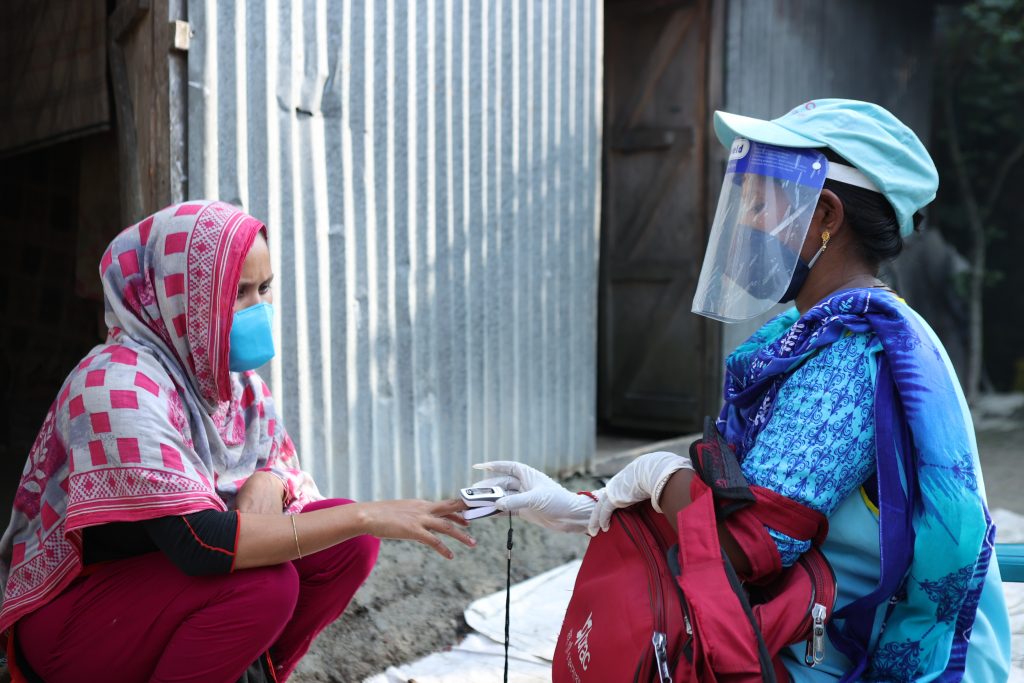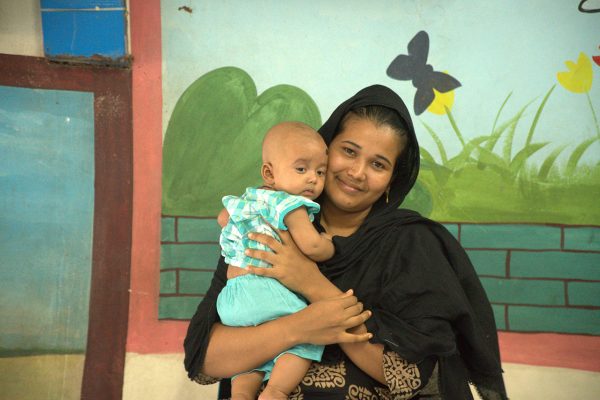50 years of serving Bangladesh: Community healthcare to pandemic response
Reading Time: 3 minutes
BRAC is currently the hub of the world’s largest non-government network of community health workers. Across Bangladesh, this network of 50,000 women are taking essential healthcare to the doorsteps of families and reaching the last mile, standing by 80 million people every year.
BRAC’s health programme began its journey in 1972 with four clinics in Sulla, a remote area in northeastern Bangladesh. The doctors and health workers at the clinics were mostly men.
Despite having trained health workers, BRAC realised that it was failing to reach the underserved in the last mile. Digging deeper, it was discovered that women living in rural conservative societies did not feel comfortable to seek healthcare services from men.
As a result, although the services were accessible, women could not avail them.
Taking the lesson learned from Sulla, and combining it with the concept of China’s ‘barefoot doctor’ model, BRAC recruited, trained and engaged women from grassroots communities to serve as healthcare providers in their own communities.
This was executed through two tiers of community health workforce: shasthya kormi (community health worker) and shasthya shebika (community health volunteer).
In order to facilitate the health workers and volunteers to earn a small income, a sustainable health entrepreneurship model was developed, which allowed them to sell personal and reproductive healthcare items such as sanitary napkins and contraceptives during their door-to-door visits.

BRAC’s community health worker providing antenatal services during a household visit. Photo credit: 2020 © BRAC
Approximately 50,000 community health workers and volunteers are currently working across 61 districts in Bangladesh. Annually, they cater to healthcare needs of approximately 80 million people in the country.
Putting community engagement at the heart of interventions: The BRAC mantra
Over the past 50 years, BRAC has made significant contributions to Bangladesh’s achievements in the healthcare sector. The secret behind creating many successful interventions was learning from evidence and an active engagement from the community.
For example, when diarrhoeal disease was the major killer of children in the 1970s, an effective formula of oral saline was already invented by Dr Richard Cash, together with other scientists of icddr,b. However, it was not being used by families in grassroots communities.
BRAC decided to take this solution out in the community and invented a simple kitchen-based formula as an alternative to the sophisticated laboratory formula, using household kitchen ingredients; a pinch of salt, a fistful of molasses, and half a litre of water.
Community health workers then visited every household in their neighbourhoods and taught at least one family member (mostly mothers) to make this life-saving oral saline through live demonstration. In order to prove that the solution was safe to consume, the health workers also took sips of the solution after making them.
Using this method, BRAC’s health workers taught over 12 million families the recipe of oral saline, which ultimately contributed to reducing the child mortality rate in Bangladesh by 45%.
Using ground insights for COVID-19 response
When the pandemic broke out in 2020, just like the rest of the world, Bangladesh did not know how to combat this invisible threat. As an immediate response – BRAC mobilised 50,000 community health workers to go door-to-door in rural areas and urban slums to educate people on the life-saving measures they could take to prevent COVID-19.
The crisis then evolved, creating multi-dimensional challenges. On one hand, the country needed to prevent and respond to COVID-19, while on the other hand, essential healthcare services also needed to be restored from the brink of collapse.
BRAC’s community-centric approach was used to address the crisis. Based on insights from the community, three key learnings shaped BRAC’s comprehensive COVID-19 response initiatives: (i) reinforcement of COVID-19 compliant behaviour is vital, (ii) community engagement is crucial for sustaining behavioural change, and (iii) close collaboration with the government is necessary for system strengthening and impact at scale.

A community health worker conducting syndromic surveillance during a household visit. Photo credit: ©BRAC, 2021
To respond to the communities’ needs, BRAC worked closely with the government and other partners to support mask distribution, syndromic surveillance followed by quarantine support, telemedicine, COVID-19 sample collection and testing, awareness building on vaccination along with capacity building of local community clinics.
BRAC also partnered with community groups across the country to ensure reinforcement for life-saving preventive measures, such as mask wearing.
Evolving with the needs of a changing Bangladesh
BRAC keeps the communities and people it works with at the heart of all its interventions – prioritising their active participation and involvement in creating solutions that work for them.
The idea is not to tell them how to solve their problems, but to provide them with the tools to build their own capacities, and create access to resources, so that they can solve their own problems. BRAC will continue to evolve and stay relevant to the changing needs of Bangladesh.
BRAC Health Nutrition and Population Programme caters to the healthcare needs of over 80 million people across Bangladesh, through a combination of community-based and facility-based services. Its community-driven healthcare approach employs 50,000 community health workers and volunteers who deliver quality affordable care to populations living in the most deprived and vulnerable conditions. BRAC’s community health workers are all women, who deliver door-to-door primary and essential healthcare, and facilitate linkages with formal providers.
Dr Morseda Chowdhury is the Director of BRAC Health Nutrition and Population Programme.
Tanjila Mazumder Drishti is a Senior Manager at BRAC Health Nutrition and Population Programme.





